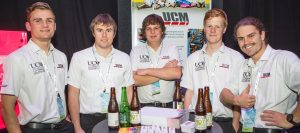
Thomas Galbraith
“An engineering degree is extremely diverse and equips you with skills that can be applied to almost any career path you may like to take. Any student willing to start an engineering degree specialising in power systems should really look no further and take up the opportunity.”
How would you introduce yourself in one sentence?
Originally from a rural background, I am a keen outdoorsman who loves to learn new skills whether it be in the classroom or on the tools.
Why did you choose to study electrical engineering?
I have always been fascinated by electrical systems. I enjoyed taking physics and calculus at school and wanted to be able to take the theoretical knowledge and apply it to real world problems. I wanted to pursue a field that was continually progressing and could always be developed further so that I would always be learning new things. Electrical engineering stood out strongly for me because it seemed to combine my interests and career aspirations quite succinctly.
In which projects have you been involved in and outside of university?
As a third professional year student, the most intriguing and challenging assignment I have been involved with is my final year project with the University of Canterbury Motorsport (UCM) team; designing and building a four-wheel-drive electric Formula SAE race car. I joined UCM at the beginning of 2016 and have since undertaken a number of projects within the team from determining the conductive material to ground the vehicle chassis, to configuration and implementation of multiple CAN Bus networks in the vehicle. As well as learning the technical knowledge that will be required to complete the project, I have enjoyed learning more about electric vehicles as the impact they will have on the electricity industry in the future is inevitable.
Outside university, I have been employed by Network Waitaki during summer holidays. I have been involved with a number of projects with the engineering, asset management and lines contracting teams. Some of these included working on an algorithm to find the best location to install auto-reclosers on the networks and helping line crews to install hardware.

2017 UCM Electrical Team. From left to right: 2017 EEA Scholarship recipient Thomas Galbraith, Ryan Cheyne, Jeremy Evans, Jacob Smith and Connor Jaine (absent: Charlie Lane)
How would you like to contribute to the electricity supply industry in the future?
My role as chairman of the IEEE Student Branch at the University of Canterbury has given me a lot of enjoyment from being in a management type position. After developing a well rounded technical ability, I am aspiring to become a leader and senior member of the electrical industry.
What is the most important piece of advice you would give to high school students wanting to start a degree in engineering? And to university students wanting to specialise in power engineering?
An engineering degree is extremely diverse and equips you with skills that can be applied to almost any career path you may like to take. Any student willing to start an engineering degree specialising in power systems should really look no further and take up the opportunity. Coming from a small South Island town, I had no idea about how extensive an electrical engineering degree would be. Over the past few years I have picked up skills in areas I never knew existed in electrical and power engineering. If you’re in the decision-making stage, don’t hesitate to reach out to young graduates or engineers in the industry if you want to learn more about what you can do with the degrees. Be prepared to work hard and enjoy joining a diverse industry that is full of opportunities.

